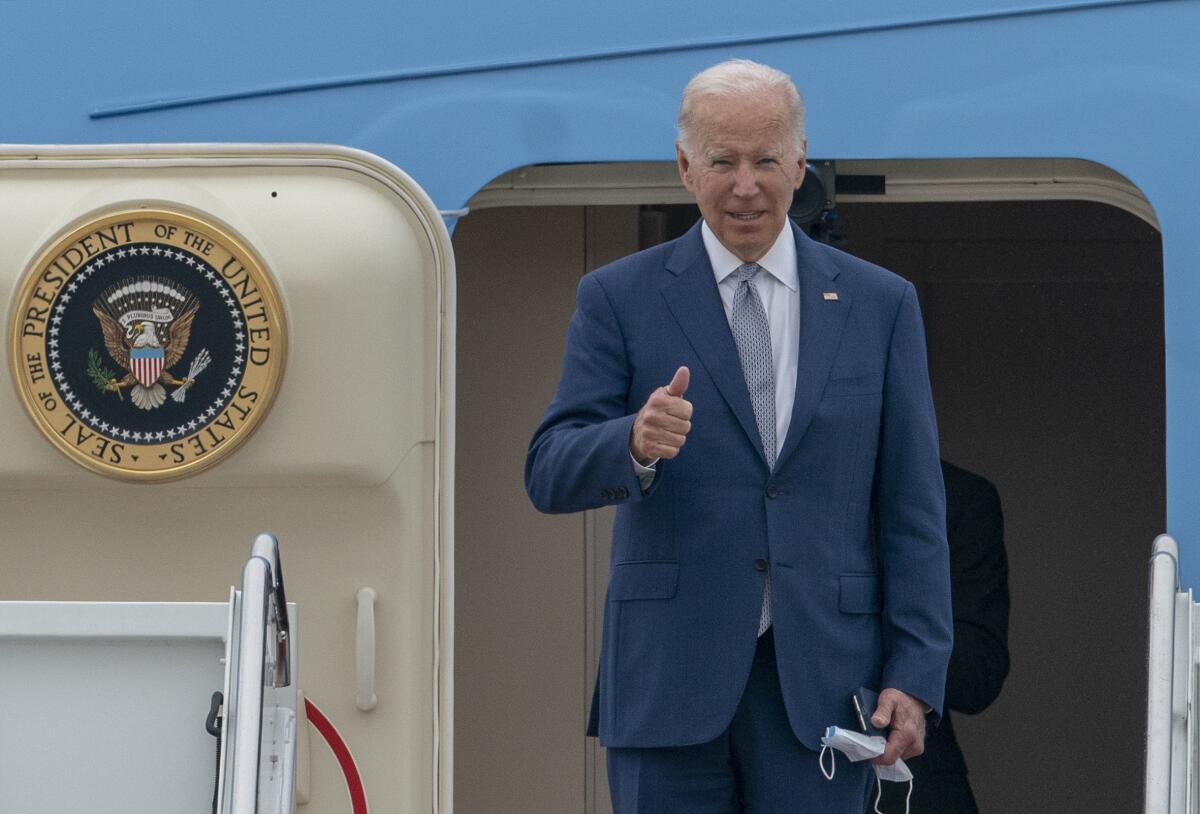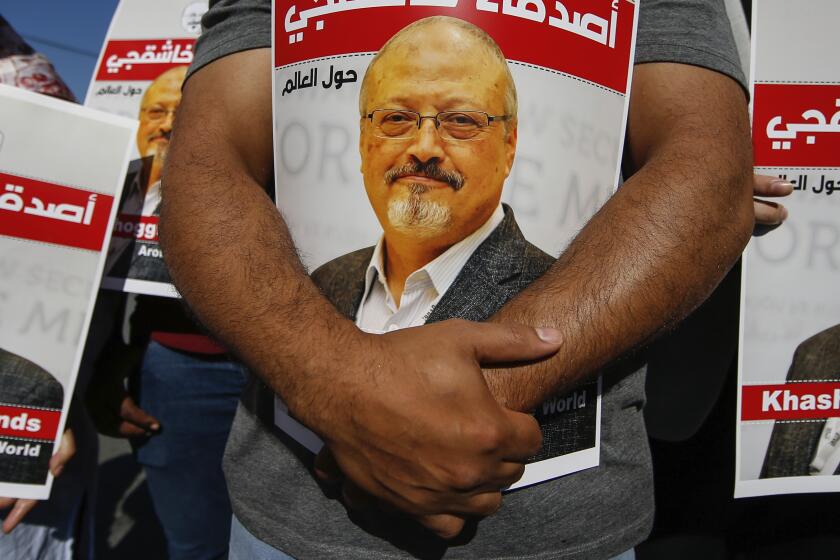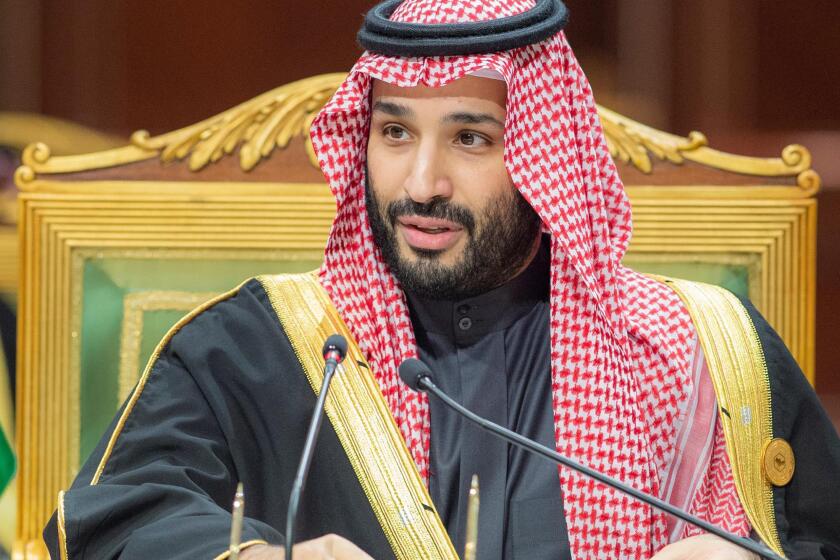Biden to visit Israel, the West Bank and Saudi Arabia next month

WASHINGTON — President Biden confirmed on Tuesday that he will visit Saudi Arabia next month for talks with its leaders, a dramatic change in his stance on the kingdom that he pledged to make a “pariah” as a Democratic candidate for the White House.
With the visit at the tail end of a July 13-16 Middle East trip that includes stops in Israel and the West Bank, Biden is edging off his adversarial stance on the Saudis’ human rights record. He’s looking to reset the relationship at a time when the U.S. could use help from the oil-rich kingdom to alleviate soaring prices at the pump for motorists at home and around the globe.
The stop in Saudi Arabia will include talks with Crown Prince Mohammed bin Salman, the de facto leader of the kingdom, according to White House and Saudi officials. U.S. intelligence officials have determined Prince Mohammed likely ordered the 2018 killing of U.S.-based journalist Jamal Khashoggi.
In a brief exchange with reporters on Tuesday, Biden bristled when asked about his upcoming visit to Jeddah and noted that his team had laid out in a statement “everything I’m doing in the Middle East.”
Human rights advocates and some Democratic allies cautioned Biden about visiting the kingdom, saying such a visit without first getting human rights commitments would send a message to Saudi leaders that there are no consequences for egregious rights violations. The Saudis have been accused of using mass arrests, executions and violence to squelch dissent.
But at a time of skyrocketing prices at the gas pump, growing worries about Iran’s nuclear program and perpetual concern that China is expanding its global footprint, Biden and his national security team have determined that freezing out the Saudis, particularly the crown prince, is not in U.S. interests.
Sen. Dick Durbin (D-Ill.) the No. 2 Senate Democrat, told CNN that Biden “has a tough job dealing with gasoline prices and trying to find ways to find new sources and supplies to bring down inflation in the energy sector.”
The prosecutor in the trial of 26 Saudi nationals charged in the slaying of Jamal Khashoggi requested that the case be transferred to Saudi Arabia.
But Durbin said he had “mixed feelings” about the visit, calling the Saudis’ human rights record “an outrage.”
The Senate’s No. 2 Republican leader accused Biden of paying too little attention to American energy.
John Thune of South Dakota said: “It just seems having to go hat in hand to the Saudis to try and get them to increase energy production because we won’t do it here. I think it’s unfortunate that an American president is put in that position.”
The Saudi Embassy in Washington described the visit as coming at the king’s invitation “to strengthen the historical bilateral relations and the distinguished strategic partnership between” the two countries.
Biden’s first trip to the Saudi kingdom as president is likely to occur later this month but details have not been finalized, a source told the AP.
The White House announced the trip after Saudi Arabia this month helped nudge OPEC+ to ramp up oil production by 648,000 barrels per day in July and August, and the kingdom agreed to extend a United Nations-mediated cease-fire in its seven-year war with Yemen. Biden called the Saudi cease-fire decision “courageous.” Prince Mohammed, who is commonly referred to by his initials, MBS, played a “critical role” in brokering an extension of the cease-fire, according to a senior administration official who briefed reporters on the condition of anonymity.
White House Press Secretary Karine Jean-Pierre said King Salman invited Biden to visit the kingdom during a gathering in the port city of Jeddah of the six Gulf Cooperation Council nations — Bahrain, Kuwait, Oman, Qatar, Saudi Arabia and the United Arab Emirates — as well as Egypt, Iraq and Jordan.
She suggested that Biden would raise human rights concerns with Saudi officials but did not directly answer whether the president would speak to Prince Mohammed about the Khashoggi killing.
“It’s important to also emphasize that while we recalibrate relationships, we are not looking to rupture relationships,” Jean-Pierre said. “But human human rights issues, human rights conversations [are] something that the president brings up with many leaders and plans to do so.”
Hala al-Dosari, a prominent rights advocate in Saudi Arabia now living and teaching in the United States, said Biden’s decision to meet with the crown prince is “a betrayal.” She also raised concerns that Biden’s visit to Israel glosses over last month’s fatal shooting of prominent Palestinian American Al Jazeera journalist Shireen Abu-Akleh in the West Bank. Independent investigations by the Associated Press and some other news organizations concluded Israeli fire likely killed the veteran journalist. Israel has said it would investigate.
Al-Dosari accused the administration of “prioritizing immediate interests over long-term goals of supporting democratic transitions” in Arab countries and “the immediate interests of securing more oil, and support for Israel.”
Biden’s first stop during the Middle East swing will be in Israel for a long-planned visit with Israeli Prime Minister Naftali Bennett in Jerusalem. He will then meet with Palestinian Authority leaders, including Mahmoud Abbas, in the West Bank. Biden will cap the whirlwind trip with the visit to Jeddah.
The trip to Israel comes at a fraught time for Bennett’s fragile coalition, as he tries to avert another election and the potential return to power of former Prime Minister Benjamin Netanyahu and as Iran’s nuclear program continues advancing.
While in Israel, Biden will take part in a virtual meeting of “I2-U2” leaders, an economic forum established late last year that includes Israel, India, the United Arab Emirates and the United States.
The president’s time in Israel also coincides with the Maccabiah Games, a sporting competition that brings together thousands of Jewish and Israeli athletes from around the globe. Biden is expected to meet with athletes taking part in the games.
Israeli officials in their engagement with the Biden administration have pressed their point of view that U.S. relations with Arab capitals, including Riyadh, are critical to Israel’s security and overall stability in the region. The visit could also provide an opportunity to kick off talks for what the administration sees as a longer-term project of normalizing Israeli-Saudi relations.
Bennett said in a statement that the visit will “reveal the steps that are being taken by the U.S. to integrate Israel into the Middle East and increase the prosperity of the entire region.”
The Palestinians, meanwhile, will be looking for progress on reopening the U.S. Consulate in Jerusalem. It served Palestinians before the Trump administration shut it in 2018 and folded its work into the U.S. Embassy in Jerusalem as part of the controversial recognition of the city as Israel’s capital.
Israel captured East Jerusalem in the 1967 Mideast war and annexed it in a move not recognized internationally. The Palestinians want East Jerusalem to be the capital of their future state.
The Palestinians also hope the Biden administration will make greater efforts to rein in Israeli settlement construction and other unilateral actions that they say hinder the eventual revival of a long-idled peace process.
Hussein al-Sheikh, a top aide to Palestinian President Mahmoud Abbas, told the AP that the Palestinians welcome Biden’s visit and hope for “positive results” but feel stymied in their decades-long quest for an independent state alongside Israel.
“What is the American vision for resolving the conflict?” he asked.
More to Read
Sign up for Essential California
The most important California stories and recommendations in your inbox every morning.
You may occasionally receive promotional content from the Los Angeles Times.












